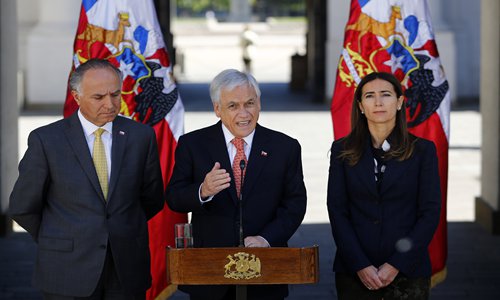HOME >> WORLD
New clashes, calls for general strike as Chile’s peso drops to historic low
Source:AFP Published: 2019/11/13 21:28:40

Chile's President Sebastian Pinera (center) announces at La Moneda presidential palace in Santiago, Chile on Wednesday that Chile has withdrawn as host of the Asia-Pacific Economic Cooperation (APEC) Economic Forum in November and the Climate Change COP25 Conference in December after several weeks of violent protests. The APEC summit was scheduled to bring together 20 world leaders from November 16 to 17. The COP25 program was due to run between December 2 and December 13. "This has been a very difficult decision, a decision that causes us a lot of pain, because we fully understand the importance of APEC and COP25 for Chile and for the world," Pinera said, according to Reuters. Photo: AP
Violent protests broke out in Chile's capital Santiago on Tuesday as the country's currency dropped to a historic low after weeks of mass street demonstrations that have left the South American country in crisis.
Clashes broke out between protesters demanding the resignation of President Sebastian Pinera and security forces close to the presidential palace.
Some 80,000 people took to the streets of Santiago as 100 organizations called a general strike. The demonstrators are demanding greater social reform from Pinera, who has announced several measures in a bid to appease protesters, including a pledge to change the constitution that dates from the 1973-90 Augusto Pinochet dictatorship.
Pinera on Tuesday announced the recall of retired police officers to help curb the unrest, but did not reissue a state of emergency, as he did at the outbreak of the crisis, which would allow the deployment of the military.
Demonstrators congregated at the Plaza Italia square, the epicenter of previous protests that have now lasted almost four weeks. They marched to seat of the workers' union - the most powerful one in Chile - before moving on toward the presidential palace.
Hooded protesters set a restaurant on fire in the area of the Plaza Italia and ransacked a hotel, torching its furniture.
Looting and clashes with police also took place elsewhere in Santiago, and a church in the historic neighborhood of Lastarria was burned.
Public schools and universities in the capital were closed while many private schools also called off classes due to safety concerns.
Chile's currency dropped more than 3 percent to a record low of 784 pesos to the dollar. The peso actually dropped to 800 during the day, well beyond the previous record of 761, from October 10, 2002, before recovering slightly at close.
It was trading at 709 to the dollar on October 18 when the protests erupted into violence.
Capital Economics said the peso's fall and Tuesday's strikes would "push up inflation" and predicted that sustained unrest would weaken growth, which it said would be lower than its previously downgraded prediction of 2.5 percent.
Posted in: AMERICAS